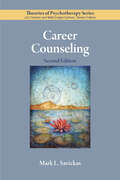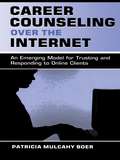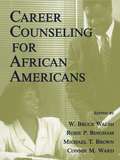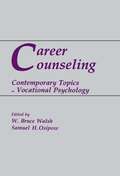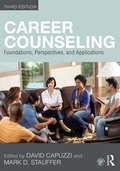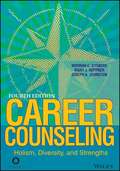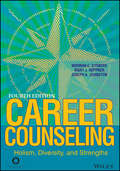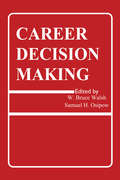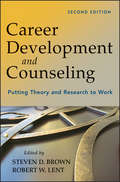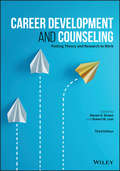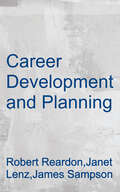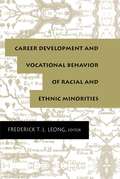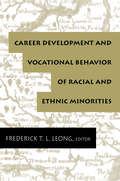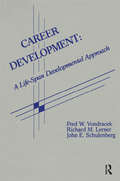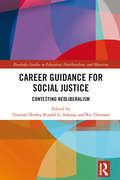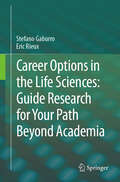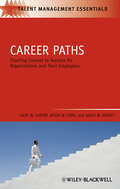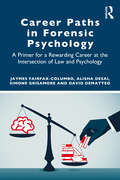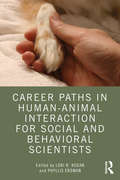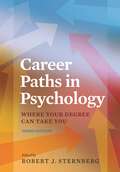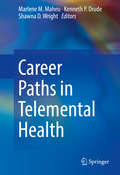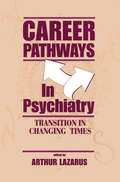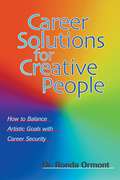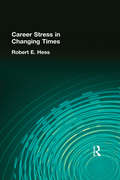- Table View
- List View
Career Counseling (Theories of Psychotherapy Series®)
by Dr. Mark L. Savickas PhDIn this second edition of Career Counseling, Mark L. Savickas updates his influential approach to reflect recent trends in the modern workplace such as telework, the increased use of temporary employees, and the emerging "gig economy." Career and vocational guidance have existed since the early 20th century, and has centered primarily around interest inventories and ways to match individuals to jobs. Savickas discusses and reviews this history as he presents his 21st century theory of career counseling: a therapeutic form completely different from traditional vocational guidance or career education. Rather than assuming that a person&’s interests and traits exist a priori and are ready to be matched to a particular career, this narrative approach recognizes the power of the individual to construct their own career story. In this book, Savickas explores his practical approach: its theory, history, therapy process, primary change mechanisms, and the empirical basis for its effectiveness. This essential primer, amply illustrated with case examples featuring diverse clients, is perfect for graduate students studying theories of therapy and counseling, as well as for seasoned practitioners interested in understanding this approach and how it might be used in their practice.
Career Counseling Over the Internet: An Emerging Model for Trusting and Responding To Online Clients
by Patricia Mulcah BoerThis is one of the first books on the subject of counseling clients via e-mail. The author has taken the area of counseling practice and systematically reviewed relevant counseling theory, counseling ethics, and counseling skills in relation to Web counseling. The objective is to provide a practical text and guide for career counselors in online service. This book will be of interest to professionals in the field of career counseling, to graduate students of counseling, and to human resource management and outplacement professionals. The book begins by articulating issues in the debate on Internet counseling, giving particular attention to counselor concerns about ethical issues and the client-counselor relationship. Next, it details the 11 necessary competencies and skills for counseling professionals in general, translating these for use online, including the role of assessment, various electronic interventions, and the pros and cons of career counseling via the Web. Specific guidelines are offered for career counselors to implement online. The book concludes with suggestions for continuing research, as well as recommendations for counselor supervision, preparation, and training models as the field makes a paradigm shift. Framed into 10 chapters, 35 question and answer examples are interspersed to bring to life the actual experiences, themes, issues, and questions presented by a global clientele regarding their career development. Each chapter closes with discussion questions for practitioners to consider themselves or discuss with students in classroom and practice settings.
Career Counseling for African Americans
by W. Bruce Walsh Rosie P. Bingham Michael T. Brown Connie M. WardThis book is the first edited volume devoted exclusively to career counseling with African Americans. African Americans are now at parity with the graduation rates of White Americans, yet disparities in employment continue to abound. At the same time the job market is changing and in need of more highly qualified workers, society must begin to understand the career and employment needs of Black Americans if it is to more effectively utilize this available market resource. Recent data indicates that stronger economies have a competitive edge if they have a more diverse workforce. More effective career counseling must be provided for African Americans so that they can become more thoroughly integrated in the world of work, thus creating stronger economies for society and more satisfying and challenging lives for this segment of the United States. Career Counselors need to be trained to effectively interact with African Americans. This volume begins to shed more light on just how to do that. This book presents nine significant topics focusing on career counseling for African Americans: *basic issues and concepts; *career assessment; *career counseling with African Americans; *career counseling with dual career African American couples; *career transition issues; *affirmative career counseling with African American women; *career counseling in non-traditional career fields; *the impact of the glass ceiling on the career development of African Americans; and *future directions in career counseling theory, research, and practice with African Americans.
Career Counseling: Contemporary Topics in Vocational Psychology (Contemporary Topics In Vocational Psychology Ser.)
by W. Bruce Walsh Samuel H. OsipowCareer Counseling aims to link the past and the present, and to look to the future for significant developments in this critical field. Seven current methods are examined in detail: * the Trait-and-Factor approach * the Person-Centered approach * the Psychodynamic approach * the Developmental approach * the Social Learning approach * the Social Psychological approach * Computer Assisted Career Counseling Written to inform practicing vocational counselors and students about the practical and applied aspects of various counseling approaches, this book will help them maintain a data-based objectivity.
Career Counseling: Foundations, Perspectives, and Applications
by David Capuzzi Mark D. StaufferCareer Counseling, 3rd edition, provides a comprehensive, holistic overview of the foundations of career counseling, information on the most effective skills and techniques, and contextual perspectives on career and lifestyle planning, all by nationally and internationally recognized experts. Updated chapters introduce important material not often addressed in introductory texts, such as rehabilitation, addictive behaviors, counseling couples and families, and working with ethnic and gender/sexual minority clients. Included throughout the text are case studies, informational sidebars, and experiential activities that enhance the reading and encourage additional contemplation of chapter content. Readers can also turn to the book’s companion website for chapter test questions, PowerPoints, and additional resources.
Career Counseling: Holism, Diversity, and Strengths (Fourth Edition)
by Norman C. Gysbers Mary J. Heppner Joseph A. JohnstonThe latest edition of this bestseller presents a holistic, strengths-based, and theoretically sound model of career development and the career counseling process that will help counselors and psychologists to update and expand their existing knowledge and skills. Useful for professionals-in-training and experienced clinicians, the career counseling process outlined in this text is both practitioner-friendly and effective with clients of all ages and circumstances. Practical strategies designed specifically to assist clients in reaching their goals and resolving their concerns are presented throughout the book. Significant attention is placed on expanding the career options and empowering the life choices of women; men; racial and ethnic minorities; gay,lesbian, bisexual, and transgender clients; clients from diverse socioeconomic backgrounds; and individuals with disabilities. Additional topics discussed include traditional and postmodern career theories and approaches, forming a productive alliance with the client, effective use of assessment inventories and instruments, helping clients respond to changes in the workplace and family life, working with resistant clients, developing client action plans, and bringing closure to the career counseling process. A new chapter titled ''Using Social Media in Career Counseling'' rounds out this exceptional publication.
Career Counseling: Holism, Diversity, and Strengths (Management - Careers Ser.)
by Norman C. Gysbers Mary J. Heppner Joseph A. Johnston“This book establishes a new standard. The focus on ‘holism, diversity, and strengths’ sets a fresh direction for the field that will inspire today’s counselors. Distinct from other texts both in terms of style and ease of use, Career Counseling provides a practical model that connects theory, practice, and resources in hopeful and affirming ways, while offering readers new skills and insights.” —Rich Feller, PhD University Distinguished Teaching Scholar, Colorado State University Past President, National Career Development Association “Gysbers, Heppner, and Johnston have continued their excellent contributions to the field with this 4th edition. Their approach is highly practical for counselors in helping diverse clients prepare for and manage the changing workplace and economy. I enthusiastically recommend this book as a must-have resource for counseling professionals and as a textbook for graduate counseling programs.” —Kenneth F. Hughey, PhD Kansas State University “We invite all students, professionals, and researchers to read this volume to enrich their practice, research, and the values by which they should be inspired to persist in being active agents of change in the world.” —Laura Nota, PhD, and the Larios Vocational Psychology Team University of Padova, Italy The latest edition of this bestseller will help both counselors-in-training and experienced clinicians update and expand their existing knowledge and skills in career counseling with clients of all ages and circumstances. Significant attention is placed on expanding the career options and empowering the life choices of women; men; racial and ethnic minorities; gay, lesbian, bisexual, and transgender clients; clients from diverse socioeconomic backgrounds; and individuals with disabilities. Additional topics discussed include traditional and postmodern career theories and approaches, forming a productive alliance with the client, effective use of assessment inventories and instruments, helping clients respond to changes in the workplace and family life, working with resistant clients, developing client action plans, and bringing closure to the counseling process. A new chapter titled “Using Social Media in Career Counseling” rounds out this exceptional book. *Requests for digital versions from the ACA can be found on wiley.com. *To request print copies, please visit the ACA website here. *Reproduction requests for material from books published by ACA should be directed to permissions@counseling.org.
Career Decision Making (Contemporary Topics in Vocational Psychology Series)
by W. Bruce Walsh Samuel H. OsipowKeeping up with new developments in vocational psychology is important to both psychological practitioners and researchers. This volume is devoted to presenting and evaluating important advances in the field of career decision making, development, and maturity. More specifically, it identifies, reports, and evaluates significant contemporary developments in vocational psychology and provides both professional workers and students with an informed understanding of the progress taking place in the field. The history and theory of the assessment of career development and decison making are explored as well as advances in career planning systems. An expanded context for the study and evaluation of career development variables is also described.
Career Development and Counseling
by Steven D. Brown Robert W. LentPraise for Career Development and Counseling: Putting Theory and Research to Work, Second Edition"This volume is an essential resource for the library of anyone interested in the field of career development, assessment, and counseling and should also prove invaluable for graduate students interested in immersing themselves in some of the best work being done today in the field of career development and counseling."-Nancy E. Betz, PhD, Professor, Department of Psychology, The Ohio State University"In this second edition, Drs. Brown and Lent continue to shape career development discourse and illustrate the ongoing significance of the fields of career development and counseling in the twenty-first century. This edition will help both researchers and practitioners alike to better understand, investigate, and promote the role of work in people's lives."-Angela Byars-Winston, PhD, Associate Professor of Medicine, School of Medicine and Public Health, University of Wisconsin-MadisonComplete coverage of leading career theories and practicesFilled with the latest empirical and practical evidence, this new edition features:A new introductory chapter that defines and discusses the importance of career counseling in the twenty-first century, and offers a brief history of the fieldNew chapters on gender, race/ethnicity, social class and poverty, sexual minority identity, disability status, personality, and relational factorsMajor theories of career developmentCoverage of the assessment of important career constructs and occupational information systemsInterventions for working with career issues across the life spanEdited by two of the leaders in the field of career development, and featuring contributions by many of the most well-regarded specialists in the field, Career Development and Counseling, Second Edition is the one book that every career counselor, vocational psychologist, and student of career development and counseling must have.
Career Development and Counseling: Putting Theory and Research to Work
by Steven D. Brown Robert W. LentDiscover comprehensive coverage of leading research and theory in career psychology with the newest edition of a canonical work The newly revised and thoroughly updated third edition of Career Development and Counseling retains many features of the celebrated second edition, including in-depth coverage of major theories of career development, interventions and assessment systems across the life span, and the roles of diversity, individual differences, and social factors in career development. This new edition also covers essential new material on emerging topics like: The future of work and preparing people for work in the new economy The psychology of working theory Working with older adults and retirees Working with the unemployed and underemployed Calling, work meaning, career adaptability, and volition This book illuminates scientifically informed career practices from an interdisciplinary perspective, engaging readers with concrete strategies and practical tips for working with clients of all kinds. Drawing on vocational, industrial, organizational, and personality psychology, Career Development and Counseling is ideal for graduate students at the masters and doctoral levels in counseling, counseling psychology, counselor education, and educational psychology.
Career Development and Planning
by Robert Reardon Janet Lenz James SampsonCareer Development and Planning: A Comprehensive Approach provides content from cognitive psychology, sociology, and economics that can be used to solve career problems and make career decisions. Career Development and Planning is an inclusive, integrated system of career learning activities intended to improve instruction and enhance learning outcomes. Career Development and Planning features three knowledge domains: cognitive and social foundations, the occupational world and work behavior, and career choice and development in individuals and organizations. Career Development and Planning includes theoretical work in cognitive psychology and relevant knowledge from the applied behavioral sciences: Part I focuses on the theory base in cognitive information processing, with detailed, practical examples of the application of the theory in typical career situations, including self-knowledge, occupational knowledge, and decision making. Part II provides a multidisciplinary overlay of issues that affect career decisions, such as economic trends, organizational culture, new work styles, and dual careers. Part III focuses on concrete steps for executing a strategic career plan and seeking employment, including an examination of familiar topics such as interviewing, resume writing, negotiating, and work adjustment, from a cognitive and multidisciplinary perspective. Career Development and Planning: A Comprehensive Approach can be re-ordered, appended with your content, and customized to fit any existing course structure! In addition, the text also comes with a comprehensive instructor manual that includes activities related to course content and PowerPoint© presentations for each chapter.
Career Development and Vocational Behavior of Racial and Ethnic Minorities (Contemporary Topics in Vocational Psychology Series)
by Frederick T. L. LeongThis volume presents the single most comprehensive source of knowledge on the career development of racial and ethnic minorities. In so doing, it serves as a resource to graduate students learning about career development and career counseling, counselors and psychologists providing career counseling to racial and ethnic minorities, and psychologists and counselors doing research on the career development of these diverse groups. In recognition of the value of both culture-specific and culture-general information about the vocational psychology of racial and ethnic minorities in the United States, the book has a dual focus. The first eight chapters are devoted to culture-specific information about career development and vocational behavior. The final two chapters synthesize and integrate the materials presented in the eight culture-specific chapters. The text has been divided into three sections. The first section focuses on career theory and research with racial and ethnic minorities. It consists of a review of the relevance and utility of various career theories and models from mainstream vocational psychology to our understanding of the vocational behavior and career development of racial and ethnic minorities -- African Americans, Hispanic Americans, Asian Americans, and American Indians. These chapters also summarize other theories from ethnic minority psychology that add to our understanding of minority career development. Finally, they review the existing empirical literature on the career development of these groups and provide a critique of this literature with recommendations for future research. The second section focuses on assessment and intervention with racial and ethnic minorities. The inclusion of the assessment dimension is very important because assessment is such a large and significant component of the career counseling process with these groups. The chapter authors offer guidelines and recommendations for providing career interventions with racial and ethnic minorities. In presenting these guidelines, they also address some of the cultural factors unique to each group that may serve either as facilitators or as inhibitors in the career counseling process. The third section includes commentaries, suggestions, reactions, and syntheses of the previous sections from scholars in the field of vocational psychology. These authors identify and examine the common principles, problems, and themes running across the chapters, and offer suggestions for advancing the field of racial and ethnic minority vocational psychology. This book will become both a valuable source of current information about the vocational psychology of racial and ethnic minorities as well as an inspiration for future research into the career development and vocational behavior of these culturally different individuals.
Career Development and Vocational Behavior of Racial and Ethnic Minorities (Contemporary Topics in Vocational Psychology Series)
by Frederick T. L. LeongThis volume presents the single most comprehensive source of knowledge on the career development of racial and ethnic minorities. In so doing, it serves as a resource to graduate students learning about career development and career counseling, counselors and psychologists providing career counseling to racial and ethnic minorities, and psychologists and counselors doing research on the career development of these diverse groups. In recognition of the value of both culture-specific and culture-general information about the vocational psychology of racial and ethnic minorities in the United States, the book has a dual focus. The first eight chapters are devoted to culture-specific information about career development and vocational behavior. The final two chapters synthesize and integrate the materials presented in the eight culture-specific chapters. The text has been divided into three sections. The first section focuses on career theory and research with racial and ethnic minorities. It consists of a review of the relevance and utility of various career theories and models from mainstream vocational psychology to our understanding of the vocational behavior and career development of racial and ethnic minorities -- African Americans, Hispanic Americans, Asian Americans, and American Indians. These chapters also summarize other theories from ethnic minority psychology that add to our understanding of minority career development. Finally, they review the existing empirical literature on the career development of these groups and provide a critique of this literature with recommendations for future research. The second section focuses on assessment and intervention with racial and ethnic minorities. The inclusion of the assessment dimension is very important because assessment is such a large and significant component of the career counseling process with these groups. The chapter authors offer guidelines and recommendations for providing career interventions with racial and ethnic minorities. In presenting these guidelines, they also address some of the cultural factors unique to each group that may serve either as facilitators or as inhibitors in the career counseling process. The third section includes commentaries, suggestions, reactions, and syntheses of the previous sections from scholars in the field of vocational psychology. These authors identify and examine the common principles, problems, and themes running across the chapters, and offer suggestions for advancing the field of racial and ethnic minority vocational psychology. This book will become both a valuable source of current information about the vocational psychology of racial and ethnic minorities as well as an inspiration for future research into the career development and vocational behavior of these culturally different individuals.
Career Development: A Life-span Developmental Approach (Contemporary Topics in Vocational Psychology Series)
by Richard M. Lerner Fred W. Vondracek John E. SchulenbergThis book places career development into the mainstream of human development research and theory. The result is a powerful synthesis of vocational psychology and the most recent advances in lifespan developmental psychology, thus offering a developmental-contextual framework for guiding theory and research in career development. Its chapters demonstrate the utility of this framework for the study of women's career development, health and careers, career intervention, and the selection and application of appropriate research methodologies. Scholars as well as intervention specialists should find this volume to be of great value. The adaption of this developmental-contextual framework for career development theory, research, and intervention may represent an important future for vocational psychology and the study of career development.
Career Guidance for Social Justice: Contesting Neoliberalism (Routledge Studies in Education, Neoliberalism, and Marxism #16)
by Tristram Hooley Ronald Sultana Rie ThomsenThis edited collection examines the intersections between career guidance, social justice and neo-liberalism. Contributors offer an original and global discussion of the role of career guidance in the struggle for social justice and evaluate the field from a diverse range of theoretical positions. Through a series of chapters that positions career guidance within a neoliberal context and presents theories to inform an emancipatory direction for the field, this book raises questions, offers resources and provides some glimpses of an alternative future for work. Drawing on education, sociology, and political science, this book addresses the theoretical basis of career guidance’s involvement in social justice as well as the methodological consequences in relation to career guidance research.
Career Options in the Life Sciences: Guide Research for Your Path Beyond Academia
by Stefano Gaburro Eric RieuxThis practical guide showcases alternative career opportunities for life science researchers beyond academia. Written by active professionals with hands-on experience, the book provides a comprehensive overview of non-academic roles and the many career paths available. In our life science education, many of us undergo classical academic training, preparing to perform university research. However, only 20-30% of students end up in permanent academic positions. The rest is leaving the field due to the challenging conditions and a lack of secured employment. As the area continues to expand and diversify, so do chances for career development outside the traditional routes. There is a growing demand for trained experts to fill various jobs in industry, government, and other sectors. Here, you will find guidance on leveraging your scientific experience to best succeed in the different roles. What is more, the preparation of your resume (CV), cover letter, and social media “attire” (LinkedIn) is covered. Interviews with selected personalities from the various domains provide unique insights into life journeys with true practical relevance. Final, this work advises universities and academic entities on how a corresponding education model could be embedded in their curricula to provide our future graduates from the life sciences with a full spectrum of their options.
Career Options in the Pharmaceutical and Biomedical Industry: An Insider’s Guide
by Josse R. Thomas Luciano Saso Chris Van SchravendijkWritten by dedicated and active professionals from different areas of the pharmaceutical, biomedical, and medtech sectors, this book provides information on job and career opportunities in various life sciences industries. It also contains useful tips to launch your own startup. The pharmaceutical, biomedical and medical technology sectors offer a wide range of employment opportunities to talented and motivated young graduates. However, many of these employment prospects are not well known to early career scientists, who concentrate primarily on the scientific and academic content of their fields of interest. The book is divided into five parts: Part 1 provides an academic perspective that focuses on the specific preparation required in the final years of study to embark on a successful career in the pharmaceutical and biomedical industries. In Part 2, industry experts discuss employment possibilities all along the drug or product life cycle, from discovery research and development to commercialisation. Part 3 follows, highlighting opportunities in support functions such as regulatory affairs or quality assurance. Part 4 focuses on additional opportunities in the wider biomedical sector, while Part 5 contains practical tips and training opportunities for entering the pharmaceutical and biomedical industries. In the epilogue, the authors reflect on this fascinating field and its career prospects. The book offers a multidisciplinary perspective on career opportunities in the pharmaceutical and biomedical industry to a wide range of students and young life scientists.
Career Paths
by Gary W. Carter David W. Dorsey Kevin W. CookCareer Paths provides practical tools and tips for developing and implementing career paths in the workplace.Discusses available resources organizations can use in developing career pathsIncludes a sample career path guideDescribes how career path efforts can be integrated with recruitment and hiring, strategic planning, succession management, employee development, and retention programsExplains how to improve employee retention using career paths and how to integrate career paths into employee training and development systemsProvides conceptual and practical toolkits for constructing career pathsDiscusses dimensions that impact career paths, such as employee movement and the nature of employee expertise
Career Paths in Forensic Psychology: A Primer for a Rewarding Career at the Intersection of Law and Psychology
by David DeMatteo Jaymes Fairfax-Columbo Alisha Desai Simone GrisamoreCareer Paths in Forensic Psychology offers a comprehensive introduction and guide to the varied career paths for aspiring forensic psychologists, showing what a rewarding career at the intersection of law and psychology can look like in practice.The book is divided into five parts. Part I provides an overview of the field of forensic psychology and also briefly explores its origins and evolution in the United States. Additionally, it explores common professional activities of forensic psychologists, as well as common career settings in which they ply their trade (academic settings, clinical settings, policy settings). Part II examines employment in academic settings, chiefly research academia, practice-oriented academia, and teaching-focused academia. Part III discusses opportunities for clinical-forensic psychology practice, in both the public sector and in private practice settings. Part IV considers career opportunities for policy-interested forensic psychologists, including in government agencies and policy-focused non-profit organizations. Finally, Part V gives readers tips on how to pick the best career “home base” for themselves, considers supplemental opportunities that forensic psychologists can pursue if their “home base” does not scratch all their professional itches, and provides guidance on how to put one’s best foot forward as a forensic psychologist and be a worthy representative of the field.This book is an ideal resource for students of forensic psychology and early-career forensic psychologists looking to start and progress their career in academic, clinical, and policy settings, as well as practicing psychologists looking to navigate career changes and transitions.
Career Paths in Human-Animal Interaction for Social and Behavioral Scientists
by Lori R. Kogan; Phyllis ErdmanCareer Paths in Human-Animal Interaction for Social and Behavioral Scientists is an essential text for students and professionals wanting to pursue a career in human-animal interaction (HAI). It is exclusively designed to navigate this field and provide information on the best education, training, and background one might need to incorporate HAI into a successful career. Kogan and Erdman bring together a diverse range of insights from HAI social scientists who have secured or created their HAI job. The book highlights six categories of work settings: academia, private practice, corporations/for profit companies, non-profit organizations, government, and other positions, to show the growing number of opportunities to blend social science interests with the desire to incorporate HAI into their careers. The book clearly outlines the career paths available to social science students and professionals, from careers connected to human services of psychology, therapy, social work, and journalism, to research or other scholarship.
Career Paths in Psychology: Where Your Degree Can Take You
by Robert J. SternbergNow in its third edition, this bestselling volume has set the standard for students seeking to find an exciting career in psychology. Its comprehensive coverage spans more careers than ever, with the vast majority of chapters new to this edition. An advanced degree in psychology offers an extremely wide range of rewarding and well-compensated career opportunities. Amidst all the choices, this book will help future psychologists find their optimal career path. The chapters describe 30 different graduate-level careers (i.e., careers for those holding a PhD, EdD, or PsyD) in three distinct areas of endeavor: academia, clinical and counseling psychology, and specialized settings such as for-profit businesses, nonprofits, the military, and schools. Each chapter explores a different career, and describes typical daily activities, the approximate range of compensation, advantages and disadvantages of the career, opportunities for employment and advancement, and how to plan one&’s educational experiences to prepare for this specialty. The authors—all highly accomplished professionals—were selected for their years of experience, their distinction in their field, and their ability to communicate their passion.
Career Paths in Telemental Health
by Marlene M. Maheu Kenneth P. Drude Shawna D. WrightThis visionary volume spotlights innovative mental healthcareers in today's technology-driven climate while inspiring readers to createtheir own opportunities. Unique and engaging perspectives from professionals acrossdisciplines and job titles describe the thought processes, ingenuity, anddiscipline behind matching technologies to the needs of specific populationsand settings. These non-traditional paths show digital advances as used infrontline, complementary, supplemental, and alternative interventions, in academicand training settings, in private practice, and in systems facing transition. Thediversity of these contributions illustrates the myriad openings technologypresents for both professional fulfillment and clients' improved well-being. Highlights of the coverage: Crisis in the behavioral health classroom: enhancing knowledge, skills, and attitudes in telehealth training. Using technology in behavior analysis: a journey into telepractice. Making iCBT available in primary care settings: bridging the gap between research and regular healthcare. Improving veterans' access to trauma services through clinical video telehealth. Virtual reality therapy for treatment of psychological disorders. Promoting and evaluating evidence-based telepsychology interventions. For mental health practitioners, practitioners in training,researchers, academics, and policymakers, CareerPaths in Telemental Health is an ideabook whose time has come--and continuesto unfold.
Career Pathways in Psychiatry: Transition in Changing Times
by Arthur LazarusCareer transitions in psychiatry have rarely been discussed openly. Yet, in the light of health care reform and other forces affecting clinical practice, it is more important than ever that psychiatrists have information about the career options within their specialty. Career Pathways in Psychiatry: Transition in Changing Times serves that purpose. It explores the professional development and career choices of prominent American psychiatrists, each of whom is identified with a particular career track and many of whom have themselves experienced one or more career transitions. The autobiographical accounts of the contributors survey a wide range of career pathways in psychiatry, including clinical practice, HMO practice, research, administration, entrepreneurism, psychoanalysis, organized medicine, the pharmaceutical industry, public psychiatry, occupational psychiatry, forensic psychiatry, and military psychiatry. These accounts are as engaging as they are informative; their anecdotal nature and conversational tone make for pleasurable reading. References at the end of each chapter serve as recommended reading for those who wish to learn more about specific career options. Intended for psychiatric residents and psychiatrists early in their careers, Career Pathways in Psychiatry will also appeal to their more experienced colleagues, including seasoned clinicians who have contemplated career changes. With a preface summarizing research on career transitions in medicine and numerous chapters shedding light on factors contributing to resistance to change, this book will also be of interest to social scientists, mental health administrators, and professional recruiters.
Career Solutions for Creative People: How to Balance Artistic Goals with Career Security
by Ronda OrmontDr. Ronda Ormont has written a comprehensive guide to finding a career that can both feed your wallet and fuel your personal creative endeavors. Included are real-life profiles, sample forms and worksheets, and essential steps to: * Learn what fields of work compliment your personality* Allocate time and energy for your own artistic pursuits * Overcome fears of change* Write resumes and interview for potential jobs * Explore self-employment options * Restructure your current career position to suit your creative needs
Career Stress in Changing Times
by Robert E HessIn terms of time, energy, and money, a career is one of the most important investments that a person makes during his or her lifetime. Career Stress in Changing Times is an exciting volume that covers the entire career cycle, from beginning through mid-career dilemmas to the retirement transition. Many key career issues and stressors--as they are experienced during each stage of one’s career--are examined. Experts also explore the major social and cultural forces that influence careers and will continue to do so in the next century, including women’s influx into the workplace, the decline of blue-collar labor, the changing demographics of our nation, and the movement toward a world economy.Career Stress in Changing Times is ideal for individuals involved in career planning activities, professionals counseling people engaged in career planning transitions, and educators involved in teaching career planning seminars. This volume is unique in that it blends the work of academic researchers with that of practitioners on the firing line; it blends theoretical and conceptual work with empirical, data-based research as well as with the results of in-depth interviews and reports from the direct experience of practitioners.
